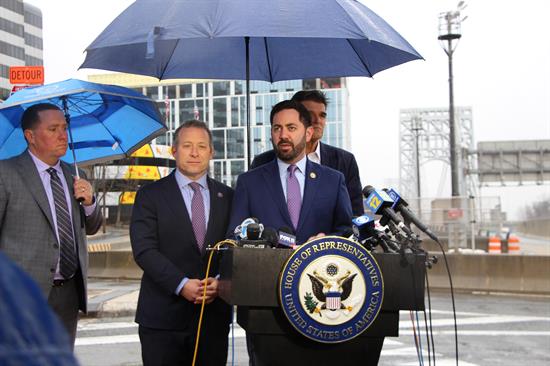Op-Eds from Mike
Wall Street Journal: Lawler and Gottheimer: Welcome to New York. That’ll Be 100 Bucks
Washington, DC,
February 1, 2024
We are from different states and political parties. Our views on issues vary widely. But on at least one thing, we passionately agree: New York’s “congestion pricing” plan for Midtown Manhattan, scheduled to begin later this year, is a greedy and unnecessary cash grab. It’s a slap in the face to hardworking families, small-business owners and commuters who want to put food on their family tables. It should be repealed, root and branch. The Metropolitan Transportation Authority, which runs public transportation in New York, stands to benefit from the revenue generated by congestion pricing. If the agency has its way, drivers entering Manhattan south of 60th Street will pay a daily driving tax of $15—nearly $4,000 a year—if they have an E-ZPass account. Those without one will be billed $22.50 a day by mail. New York being New York, it doesn’t stop there. The MTA has unilateral authority to declare “Gridlock Alert Days” whenever it needs to line its pockets more, which will add 25% surge pricing to the daily invoice. The state has also reserved the authority to raise the congestion tax by 10% in 2024, its very first year. For drivers entering the city from New Jersey and suburban Rockland County, N.Y., the congestion tax is a looming nightmare. Drivers will pay as much as $24.75 a day on top of the $17-a-day bridge and tunnel tolls, plus the cost of gasoline and parking. A single trip into the city could easily cost families $100 before they even get a cup of coffee or a bite to eat. New York is ostensibly trying to get workers to return to the office and diners, viewers and shoppers back into Manhattan restaurants, theaters and retail stores. Good luck with that. To add insult to injury, the state disingenuously marketed the tax to the public. We were told it would stop gridlock. It won’t. We were told it would improve air quality. In fact, it will make it worse for hundreds of thousands of drivers and adjacent neighborhoods. We were told the MTA—the worst-run transportation agency in America—needs the money as leverage for more borrowing. The MTA would be flush with cash if it were even moderately well run. The agency, which loses more than $700 million annually in unpaid fares, was flooded with billions of federal Covid-19 recovery dollars in recent years. Much of that money has been swallowed up by historic cost overruns. We just learned that another $1 billion will be wasted to build unnecessarily large Second Avenue subway stations—much of which the public will never see. Notably, $1 billion is exactly what the MTA claims the congestion tax will produce in revenue during its first year. But its math is wrong. According to an analysis performed by Mr. Gottheimer’s office, the agency will actually collect $3.4 billion annually from drivers. The MTA’s own assessments describe how the congestion tax will increase traffic in many New York and New Jersey neighborhoods and reroute carbon-belching truck traffic into low-income communities that already suffer from some of the highest asthma rates in the nation. A January 2023 study by the Black Institute titled “Just Call It a Black and Brown Toll” showed how the congestion tax will disproportionately affect inner-city communities. Their pleas have fallen on deaf ears. The MTA’s most egregious sin continues to be its blatant, thoughtless disregard for how it uses taxpayer money. The agency is always crying broke, but it never fixes what’s wrong. The Second Avenue subway cost New Yorkers $4.45 billion for two miles of track—$1.26 million a yard. The congestion tax is much the same: a shameless cash grab. After decades of overspending, incompetence and mismanagement, the MTA should focus on cleaning up its own mess. Hardworking families shouldn’t be forced to subsidize failure. Mr. Lawler, a Republican, represents New York’s 17th Congressional District. Mr. Gottheimer, a Democrat, represents New Jersey’s Fifth Congressional District. https://www.wsj.com/articles/new-york-citys-100-tax-on-drivers-policy-congestion-pricing-cars-traffic-b2ced5fb |




